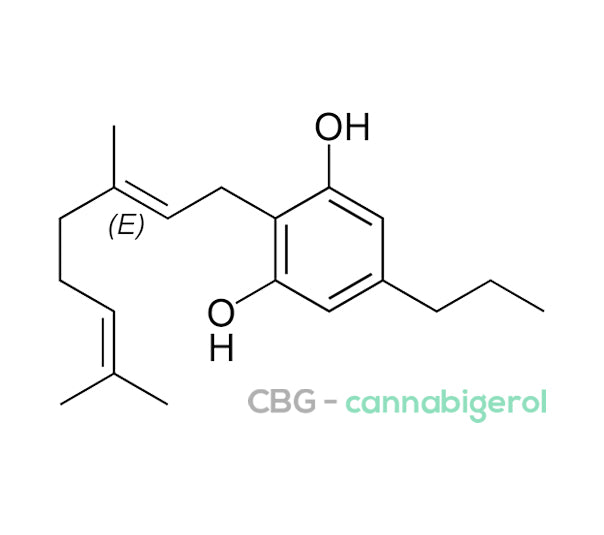
Get Moving Pain-Free with cbdDR's CBG products
Featured collection
-
800mg CBG-Rich Tincture Anti-Inflammatory and Energy
Regular price $32.00 USDRegular priceUnit price / per
CBG
(Cannabigerol)
Experience the unique benefits of cbdDR's broad-spectrum & isolate CBG products. With specialized extraction techniques, we ensure that our CBG products contain high-quality CBG, offering benefits such as anti-inflammatory properties, pain relief, and mood enhancement. Discover the power of CBG and enhance your wellness journey with cbdDR's CBG products.
The "Mother" Cannabinoid
-
CBG Medical Benefits:
- Non-intoxicating
- Digestive benefits
- Antibacterial benefits
- Pain & inflammation reduction
Potential CBG Benefits
-

Pain & Inflammation Relief
Research suggests that CBG may have stronger pain-relieving and anti-inflammatory properties compared to CBD alone. CBG interacts with various receptors in the body involved in regulating pain and inflammation, potentially making it a more potent option for managing these symptoms. CBDdr's isolated CBG products are a great addition to any pain management routine.
-

Recovery
CBG has also shown promise in promoting recovery. Like CBD, CBG interacts with the body's endocannabinoid system and may have anti-inflammatory properties that can aid in reducing muscle soreness and promoting healing. Additionally, CBG may have neuroprotective effects that support brain health and recovery from exercise-induced stress.
-

Enhances Mood
Studies suggest that it may have potential in maintaining overall wellness and promoting an enhanced mood. CBG interacts with the endocannabinoid system which plays a role in regulating mood and focus.
-

Non-Psychoactive Benefits
CBG, similar to CBD, is non-intoxicating and does not cause a psychoactive effect. Research suggests that CBG can bind to both CB1 and CB2 receptors in the endocannabinoid system, allowing it to interact with the body's internal processes. Additionally, CBG may have the ability to modulate or counteract the effects of other cannabinoids, including THC.

What is CBG?
CBG, or cannabigerol, is a minor cannabinoid found in cannabis plants. It interacts with the body's endocannabinoid system and mimics the function of endocannabinoids. Unlike THC, CBG does not produce psychoactive effects. It is often referred to as the "stem cell" cannabinoid because it serves as a precursor to other cannabinoids. While CBG is present in smaller quantities compared to THC and CBD, it offers potential therapeutic benefits.
CBG FAQ
How is CBG isolated?
During the early stages of cannabis plant growth, CBGA (cannabigerolic acid) is the precursor to all cannabinoids, including CBG. As the plant matures and is exposed to UV light, CBGA breaks down and converts into THCA (tetrahydrocannabinolic acid) and CBDA (cannabidiolic acid), which then become THC and CBD through decarboxylation. This process means that only a small proportion of CBGA will naturally develop into CBG, unless the plant is specifically bred to have higher levels of CBG.
Why is CBG known as the "mother" cannabinoid?
CBG is referred to as the "mother cannabinoid" because it serves as the precursor to other cannabinoids such as THC, CBD, and CBC. In the early stages of the plant's growth, CBG is the first cannabinoid produced and is then converted into other cannabinoids as the plant matures. This conversion happens through various enzymatic processes. Without CBG, the production of other cannabinoids would not be possible, hence its name as the "mother cannabinoid."
What is CBG and how does it work?
CBG, or cannabigerol, interacts with the body's endocannabinoid system, which plays a crucial role in maintaining the body's optimal state. CBG mimics the function of endocannabinoids, the natural compounds produced by our bodies. Unlike THC, CBG lacks psychotropic effects, meaning it does not induce a "high." As a result, CBG offers potential therapeutic benefits without the mind-altering effects associated with THC. CBG, or cannabigerol, is one of the many cannabinoids found in cannabis plants. It is considered a minor cannabinoid, present in smaller quantities compared to THC and CBD. CBG is often referred to as the "stem cell" or "mother" cannabinoid because it is the precursor to other cannabinoids.

